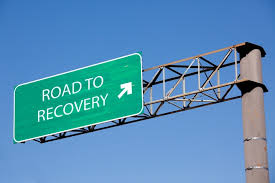A 12-Step Program for Republicans
Wednesday, January 27th, 2021By Bob Gaydos
 Denial is the first, big obstacle. Until and unless they can admit they were powerless over Donald Trump, Republicans have no hope of recovering. They will be forever known as Trumpaholics, people addicted to avoiding reality and destined for a life that is, by any reasonable measure, unmanageable. I cite the last five years as evidence.
Denial is the first, big obstacle. Until and unless they can admit they were powerless over Donald Trump, Republicans have no hope of recovering. They will be forever known as Trumpaholics, people addicted to avoiding reality and destined for a life that is, by any reasonable measure, unmanageable. I cite the last five years as evidence.
But, as they say, there is a solution, one that has changed lives for the better for millions of people worldwide — a 12-Step program. It has worked miracles for alcoholics; it can work for Trumpaholics.
I’ve written on addiction and recovery for more than a dozen years. One of the recurring stories I’ve heard over that time is that the 12 Steps of Alcoholics Anonymous are not just a proven way to stop drinking, but also an excellent formula for living a good life. Getting rid of the booze — or in this case, the Donald — is only the beginning. Republicans can reap these rewards, individually or as a party … but only if they really want to change.
So, with a deep bow to Bill Wilson and A.A. and adapted in all humility, here are the 12 Steps of Recovery for Republicans:
- We admitted we were powerless over Trump, that our party had become unmanageable. This state of affairs is usually evident to non-addicts of the individual’s acquaintance well before that aha! moment arrives, if it does. Members of A.A. say this is the only step they have to get perfect, for obvious reasons. If a Republican can’t admit — still — that Trump dominates his or her every political thought or action, there’s no sense going on to Step 2. Denial. However, if Republicans can look at the past five years of saying yes to virtually everything Trump did or said and acknowledge the trouble that this blind obedience, this dependence, has caused in Republicans’ lives (broken relationships, lost jobs and opportunities, ruined reputations, trouble with the law) as well as the pain it inflicted on the lives of many others, there is hope.
- Came to believe that a power greater than Trump or Mitch McConnell could restore us to sanity. (No one said this was easy.) No, this does not mean everyone becoming Evangelical Christians. Quite the opposite. That would simply be swapping blind faith in Trump for blind faith in other con men and women. Give me your money and you will be saved. For a party that professes a belief in strong family values and makes a public display of respecting religious (well, Christian) teachings, this should not be a problem. Theoretically. However, I think it could be challenging to many Republicans who have become used to giving lip service to their professed religious beliefs. Skeptical alcoholics are sometimes advised to pick a higher power of their own choosing or at least to believe that someone whose sobriety they admire has such a belief. Instead of putting their hands on some charlatan’s shoulders and bowing their heads, supposedly in prayer, Republicans should look within the ranks (or without) for a source of strength, hope and faith and emulate that person. It should be someone with a sincere, demonstrated, spiritual footing. Hint: it’s not Ted Cruz. Not a Koch brother or Rupert Murdoch either. Keep looking. Someone more like Lincoln, remember? It may take a little time. That’s OK.
- Made a decision to turn our will, our money and our platform over to the care of whatever power we came up with in Step 2. A key step. Last time out, Republicans did this almost accidentally with Trump. That was blind, misplaced faith in the flashy guy. No willpower, true, but no sense of shared responsibility to the greater good. This time, they need to decide to follow the lead of someone with sound moral principles and then lead their political lives accordingly. That is, decide to do the rest of the steps.
- Made a searching and fearless moral inventory of ourselves. This step could be a problem for a lot of Republicans because it requires honesty. But if they want to change, they need a list of the things they want to change. For example, lying that the presidential election was stolen while knowing there was never any proof of this would be something to put high on the list. Lying is bad, even in politics. Hypocrisy is just a fancy word for lying. Also, stealing and harming others so as to benefit yourself. Breaking the law, too. All Trump’s pardons did not remove the guilt, they merely freed the guilty.
- Shared with that higher power from step two, with ourselves and another human being the exact nature of our wrongs. In other words, look in the mirror and say, “I have been a self-serving, lying, backstabbing, selfish, hypocritical, cowardly son-of-a-bitch for the past four years,“ and then release a statement to that affect — in detail — on social media. Get Liz Cheney or Lisa Murkowski to pose in the picture with you. Piece of cake.
- 6. Were entirely ready to have my higher power (with the help of a new party leader of sound moral standing) remove these defects of character. Basically, Republicans must resign themselves to the fact that they have been a group of self-serving, lying, cowardly, etc. since they chose Trump as their leader. This is the truth, the real news. When and if they accept it, they can move on to Step 7.
- Humbly asked him or her to remove our shortcomings. Harder than it sounds. First of all, shortcomings seldom ever really go away. They find new hiding places. Republicans will have to become aware of them and try to avoid them. Stop lying about the deficit, That’s a lifetime of work and will require humility. Good luck finding someone to explain that concept to Republicans. Again, not Ted Cruz, who confuses humiliation with humility.
- Made a list of all persons we had harmed and became willing to make amends to them all. Really. You don’t get to totally screw up a country and just walk away like nothing happened. Not if you want to change. Start with the kids in the cages.
- Made direct amends to such people wherever possible except when to do so would injure them or others. Again, start with the kids in the cages. That last part lets Republicans stay out of jail and not hurt their own family by admitting how they routinely cheated minority voters with sketchy redistricting plans and harsh voter registration laws.
- Continued to take personal inventory and when wrong promptly admitted it. This is the new way of living part of it. “I’m sorry; I was wrong.” Try not to abuse this step.
- Sought through regular meetings and work sessions, at which an honest exchange of ideas is encouraged and welcomed, to maintain contact with our new party leader seeking only to learn what the new Republican Party stands for and the power and courage to carry that out. Prayer and meditation wouldn’t hurt either.
- Having had a major reprieve and possibly a spiritual awakening as the result of these steps, we tried to carry the new Republican Party message to Trumpaholics and others and to practice its new principles in all our affairs. One day at a time.
That’s it. The formula for recovery for the Republican Party. But there is one thing more. With alcoholics, the drinking is just a symptom of the disease. When the drinking stops, the disease (much of the behavior) doesn’t go away. That’s why recovery is a daily practice. To avoid relapse.
The real question for Republicans is what made them Trumpaholics in the first place.
rjgaydos@gmail.com
Bob Gaydos is writer-in-residence at zestoforange.com.






